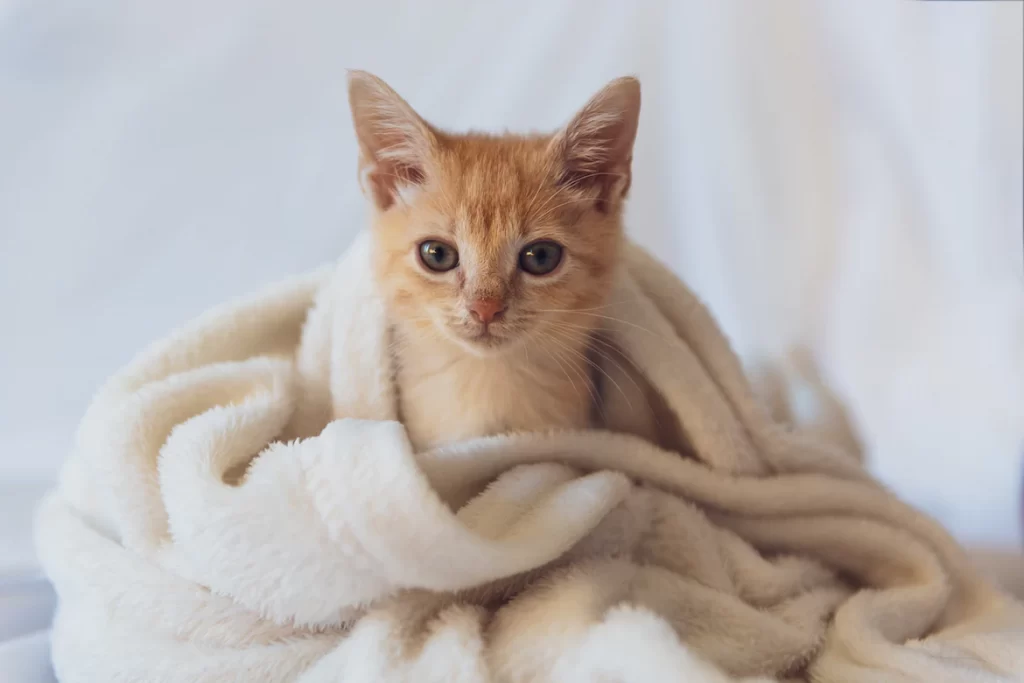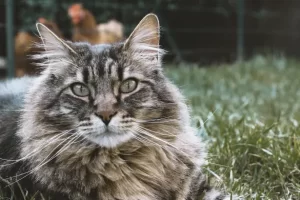Last updated on January 31st, 2023 at 09:02 am

Introduction
As soon as little kittens enter into this world, their mother begins to instinctively cuddle and nurse them. In fact, just like babies, the nutrition that kittens receive during these times will ensure that they are healthy and fit as they develop Yet, the habits cats exhibit can be vastly different from humans, especially as they begin to mature. This is especially true for cats that spend their time nursing on blankets. So, the question is, why do cats nurse on blankets? The answer to this question may vary based on the explanations listed below.
Why do cats nurse on blankets?
1. Provides Comfort and Security
Based on information from various sites on cats, cats that nurse on blankets may be looking for comfort and security. This is primarily because most blankets are not only warm and cozy but also soft to the touch.
Also, because some of the smaller cats may be timid, fearful, and scared when they are around new people that they do not know, they tend to hide away in small, tight spaces. Therefore, these blankets can be just what they need to create the perfect safe environment. In fact, whenever a cat does not feel well, they may seek out the warmth of these extra-soft materials.
2. Considered to be Instinctive
As mentioned above, the need for a cat to protect himself is also considered to be a part of their instincts. Since the younger cats are no longer on their mom’s care after they stop nursing, they may begin to wean themselves by simply nursing on a blanket instead.
3. Makes them Feel Good
Another reason why some cats may nurse on a blanket is to make them feel good. Like a toddler holding on to their security blanket, they like the way it makes them feel. This is because security blankets and other transitional objects usually help babies and cats in a number of ways. First, these objects comfort them while their caretakers are not around. And here are some common reasons why:
Sucking is good for causing several different things to happen to cats during these times.
Nursing on a blanket can help with producing feel-good hormones (oxytocin).
Easier for the cat to relax since the Oxtyon induces a trance-like state.
Nursing on the blanket can help with triggering previous recent memories of the cat’s nursing time with their moms.
4. Cats were taken from their mothers at an early age
Before kittens are placed in a new home away from their moms, there are some essentials that must be done first. One of the most important is normally related to the length time that kittens actually spend with the mother cat. Ideally, the bonding process usually takes about 10 to 12 weeks, at the least.
This is the length of time that it takes for their moms to wean the kitten from mom’s milk. Actually, the schedule should be as follows:
Nursing takes about a six-weeks.
Mother cat teaches her kittens what they need to know to be a cat within 4 to 6 weeks.
She teaches her kittens how to use the litter box.
Mother cats teach their kittens how to hunt.
All of these things are very important to their normal development. On the other hand, if this time is shortened for any reason, the likelihood of the kitten maturely normally is lessened. For example, these kittens will continue to suck on their blankets since it reminds them of their moms. Therefore, this is one of the main reasons why the answer to questions like, why do cats nurse on blankets may vary from one situation to another. In some cases, this may also be one of the most common reasons why some cats may sulk on their blankets even when they reach adolescence ages and beyond.
5. Helps with lessening stress or anxiety
Anxiety and stress do not only adversely affect humans but also cats, too. In some cases, the anxiety and stress that the cat feels may be due to a number of different changes in their environment. Some of the most notable and common are often related to the owner of the cat bringing others into their environment that they are not familiar with.
Based on the stress and anxiety that they feel, they may begin to regress in their actions. For instance, even if they have never sucked on a blanket before, they may start these odd habits, particularly if they are exhibiting signs of jealousy. In short, the cat may begin to nurse on the blanket as a means of coping with the new situation or stranger that has entered its territory.
6. Scent Marker
In some situations, the reason why a cat will begin to nurse on a blanket is to leave their scent. In short, it is a scent marker that cats will normally do for a number of different reasons. Here are a few reasons that explain what’s actually going on.
Duplicating their own actions when they were kneading on their mom’s stomach to induce more milk as they nursed. Use the same actions to spread their fragrance on the blanket.
A way to console themselves when it is needed then and later.
7. Bonding with other Pets and their Owners
Cats may nurse on a blanket when they are bonding with others. It really does not matter if it is the owner, a child inside the home or another animal, this especially the case when the cat is trying to learn how to bond easier without being anxious.
8. Cats Enjoy the Taste
When you see a cat nursing on a blanket, they may simply be feeding on the materials that it is made of. Since the flavor of the cloth may be not only a pleasant memory of their nursing days, but it may also be a material that is tasty. Therefore, the cat may nurse on the blanket while also eating the corners of the blanket. Whatever the case, the answer to the question, why do cats nurse on blankets may vary on a case-by-case basis.
How to stop this behavior?
If your cat begins to show indications of worry or anxiety while left alone, it may be time to seek expert assistance. Here are five suggestions for preventing a cat from nursing on blankets:
1. Keep your cat entertained with toys
Keeping your cat engaged with catnip toys might help to lessen anxiety and prevent them from nursing on blankets. Choose interesting and stimulating toys, such as puzzle feeders or chase toys.
2. Provide hiding places for your cat
Cats feel more secure when they have a spot to hide away from the outside world. Giving your cat a somewhere to hide, such as a cat tree or a cardboard box, can help to alleviate their nervousness and prevent them from nursing on blankets.
3. Establish a secure zone
Providing a safe haven for your cat can help to alleviate their nervousness and prevent them from nursing on blankets. This area should be peaceful and quiet, with little activity and no loud noises. You might wish to put a litter box in this area for your cat to use.
4. Pay attention to your cat
Giving your cat attention and affection will make them feel less anxious and stop feeding on blankets. Make it a point to play with and pet your cat on a daily basis.
5. Seek expert assistance
If you’ve tried these suggestions and your cat is still acting distressed or anxious, it’s time to seek expert help. Your veterinarian can help you establish if your cat is experiencing separation anxiety and provide you with advice on how to stop it.
Conclusion
Even though nursing on blankets is perfectly typical behavior for young cats, it can become quite annoying when an adult cat continues to engage in this behavior. There are a few different things you may do if you’re having problems discouraging your cat from nursing on blankets or other fabrics. You’ll find some suggestions above. However, if the condition continues or appears to be making you and your cat uncomfortable, you should discuss the matter with your vet as soon as possible.


